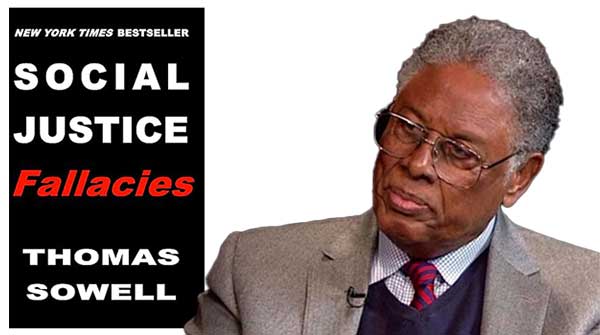There are no sacred cows that Sowell doesn’t debunk in Social Justice Fallacies
 Last month, Thomas Sowell, age 93, a famed economist and author of more than 40 books, published his latest: Social Justice Fallacies. In it, he asserts plain facts such as that life is unfair and central planners are fallible, and realities are too often ignored or downplayed by those looking to impose top-down visions of “social justice.”
Last month, Thomas Sowell, age 93, a famed economist and author of more than 40 books, published his latest: Social Justice Fallacies. In it, he asserts plain facts such as that life is unfair and central planners are fallible, and realities are too often ignored or downplayed by those looking to impose top-down visions of “social justice.”
He then proceeds to attack price controls, minimum wage laws, the myth that American black poverty is due to systemic racism, high marginal tax rates, teachers’ unions trying to preserve a monopoly on schooling, exaggerations of income inequality by people who ignore income mobility, affirmative action, “sex education” (Sowell used the scare quotes repeatedly) in public schools, and many other things besides.
For each argument, Sowell comes armed with facts, examples, and statistics.
 |
| Latest book reviews |
| How England and France were once almost one
|
| Piecing together the last days of Imperial Japan
|
| The Manhattan Project’s indispensable man
|
On the notion that the United States is a systemically racist or white supremacist society, Sowell writes that the median incomes of Americans of Chinese, Japanese, Indian, and Korean ancestry are higher than the median incomes of white Americans. Citing a 2019 U.S. Census Bureau survey, he points out that “among full-time, year-round male workers, Asian Indian males earned over $39,000 a year more than white male full-time, year-round workers” – an unlikely outcome if white supremacy was pervasive.
Black family poverty has long been higher than white family poverty, but as Sowell explains, the poverty rate of black married-couple families is consistently below the national poverty rate. “If black family poverty is caused by ‘systemic racism,’” he asks, “do racists make an exception for blacks who are married?”
Another rhetorical question from Sowell: “Are Asians ‘kept out’ of professional basketball or Californians ‘kept out’ of the National Hockey League?”
In American sports, he notes, “blacks are very over-represented in professional basketball, whites in professional tennis, and Hispanics in Major League Baseball.” There are more NHL players from Sweden than California, even though Sweden is on another continent with about one-quarter of California’s population. But these facts do not mean professional sports leagues all engage in racism or other bigotry. No affirmative action or other initiative is needed to “correct” these unequal outcomes between groups.
If Sowell’s arguments against government economic control, myth-busting on racial issues, explanations that disparities do not imply discrimination, and other sections of his book sound familiar, it is because he has written about these issues for decades. The same fallacies he and others have repeatedly debunked keep reappearing; thus, the need to keep whacking them down.
In Social Justice Fallacies, Sowell again attacks racial preferences in university admissions, arguing that admitting minority students into university programs for which they are not academically qualified does them no favours. Black students at the 80th percentile are very good students, but putting them into elite programs where their classmates are in the 99th percentile sets them up for failure.
Under affirmative action, Sowell writes, most black students admitted to the University of California, Berkeley during the 1980s failed to graduate. Another policy activists promote in the name of social justice, but that hurts blacks: minimum wage laws, which the data show significantly increases black teenage unemployment by pricing many of them out of jobs.
There are no sacred cows in Social Justice Fallacies. Sowell argues that “surrogates who introduced ‘sex education’ into public schools in the 1960s” were pre-empting parents’ decisions about when and how to teach their children about sex. He points to data showing that before the introduction of public school “sex education,” venereal diseases and teenage pregnancies were declining for years. But after its introduction, teenage pregnancies rapidly rose and the incidence of venereal diseases either rose or declined less rapidly than before. These facts alone do not prove causation between public school “sex education” and venereal diseases and teenage pregnancies, but neither are they encouraging.
Explaining facts and demolishing fallacies, as Sowell does, is important because when activists distort reality by fashioning narratives to justify their top-down initiatives, they often cause more harm than the original injustices (real or perceived) they say they want to correct.
Citing Barack Obama’s memoir, Dreams From My Father, Sowell gives the example of a young black man who wanted to become a pilot but decided not to pursue it because he thought the Air Force would never let a black man fly. Sowell points out this was decades after a whole squadron of black American fighter pilots flew in the Second World War.
“Whoever indoctrinated this young man,” Sowell concluded, “did him more harm than a racist could have by keeping him from even trying to become a pilot.”
Matthew Lau, a Toronto writer, is a senior fellow with the Aristotle Foundation for Public Policy and a chapter author in the new book The 1867 Project: Why Canada Should Be Cherished, Not Cancelled.
For interview requests, click here.
The opinions expressed by our columnists and contributors are theirs alone and do not inherently or expressly reflect the views of our publication.
© Troy Media
Troy Media is an editorial content provider to media outlets and its own hosted community news outlets across Canada.
